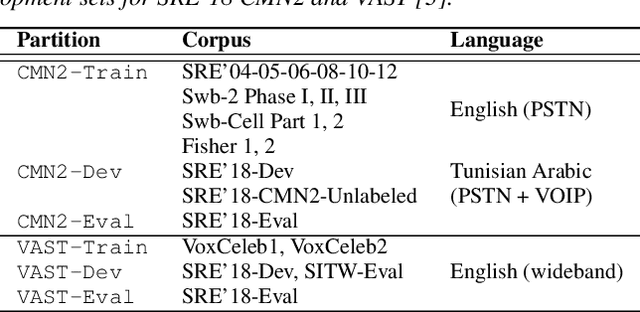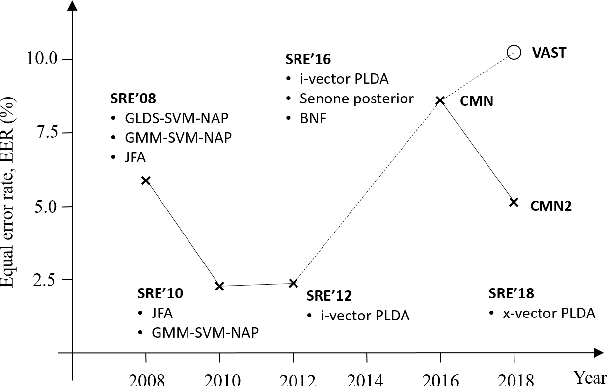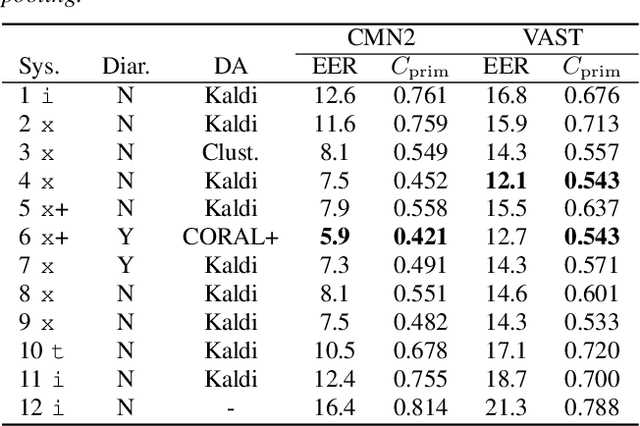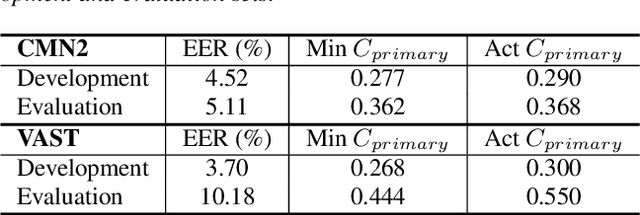Hitoshi Yamamoto
I4U System Description for NIST SRE'20 CTS Challenge
Nov 02, 2022



Abstract:This manuscript describes the I4U submission to the 2020 NIST Speaker Recognition Evaluation (SRE'20) Conversational Telephone Speech (CTS) Challenge. The I4U's submission was resulted from active collaboration among researchers across eight research teams - I$^2$R (Singapore), UEF (Finland), VALPT (Italy, Spain), NEC (Japan), THUEE (China), LIA (France), NUS (Singapore), INRIA (France) and TJU (China). The submission was based on the fusion of top performing sub-systems and sub-fusion systems contributed by individual teams. Efforts have been spent on the use of common development and validation sets, submission schedule and milestone, minimizing inconsistency in trial list and score file format across sites.
Task-aware Warping Factors in Mask-based Speech Enhancement
Aug 27, 2021



Abstract:This paper proposes the use of two task-aware warping factors in mask-based speech enhancement (SE). One controls the balance between speech-maintenance and noise-removal in training phases, while the other controls SE power applied to specific downstream tasks in testing phases. Our intention is to alleviate the problem that SE systems trained to improve speech quality often fail to improve other downstream tasks, such as automatic speaker verification (ASV) and automatic speech recognition (ASR), because they do not share the same objects. It is easy to apply the proposed dual-warping factors approach to any mask-based SE method, and it allows a single SE system to handle multiple tasks without task-dependent training. The effectiveness of our proposed approach has been confirmed on the SITW dataset for ASV evaluation and the LibriSpeech dataset for ASR and speech quality evaluations of 0-20dB. We show that different warping values are necessary for a single SE to achieve optimal performance w.r.t. the three tasks. With the use of task-dependent warping factors, speech quality was improved by an 84.7% PESQ increase, ASV had a 22.4% EER reduction, and ASR had a 52.2% WER reduction, on 0dB speech. The effectiveness of the task-dependent warping factors were also cross-validated on VoxCeleb-1 test set for ASV and LibriSpeech dev-clean set for ASV and quality evaluations. The proposed method is highly effective and easy to apply in practice.
I4U Submission to NIST SRE 2018: Leveraging from a Decade of Shared Experiences
Apr 16, 2019



Abstract:The I4U consortium was established to facilitate a joint entry to NIST speaker recognition evaluations (SRE). The latest edition of such joint submission was in SRE 2018, in which the I4U submission was among the best-performing systems. SRE'18 also marks the 10-year anniversary of I4U consortium into NIST SRE series of evaluation. The primary objective of the current paper is to summarize the results and lessons learned based on the twelve sub-systems and their fusion submitted to SRE'18. It is also our intention to present a shared view on the advancements, progresses, and major paradigm shifts that we have witnessed as an SRE participant in the past decade from SRE'08 to SRE'18. In this regard, we have seen, among others, a paradigm shift from supervector representation to deep speaker embedding, and a switch of research challenge from channel compensation to domain adaptation.
A norm knockout method on indirect reciprocity to reveal indispensable norms
Mar 11, 2017



Abstract:Although various norms for reciprocity-based cooperation have been suggested that are evolutionarily stable against invasion from free riders, the process of alternation of norms and the role of diversified norms remain unclear in the evolution of cooperation. We clarify the co-evolutionary dynamics of norms and cooperation in indirect reciprocity and also identify the indispensable norms for the evolution of cooperation. Inspired by the gene knockout method, a genetic engineering technique, we developed the norm knockout method and clarified the norms necessary for the establishment of cooperation. The results of numerical investigations revealed that the majority of norms gradually transitioned to tolerant norms after defectors are eliminated by strict norms. Furthermore, no cooperation emerges when specific norms that are intolerant to defectors are knocked out.
* 15 pages (incl. supplementary materials), 6 figures, 7 table
 Add to Chrome
Add to Chrome Add to Firefox
Add to Firefox Add to Edge
Add to Edge